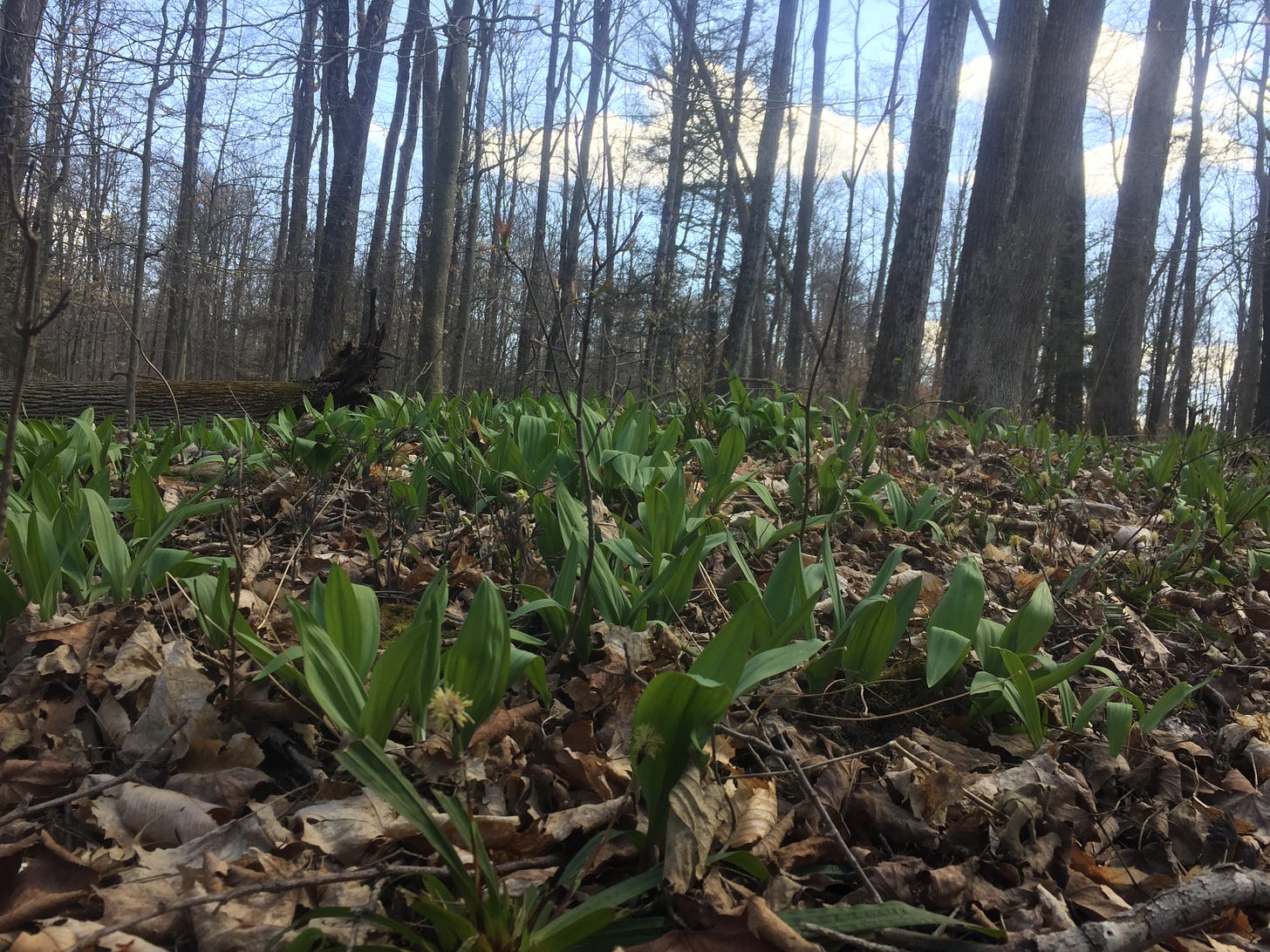Do you know what ramps are? They’re also known as wild leeks, but in Appalachia, which we’re just at the very Northern tip of here, they’re called ramps. They come up in the woods starting in early April and, for me, are a sure sign that spring is finally here. In one of my favorite stretches of woods— the muddy area next to Jennings Pond— there are hundreds of thousands of them covering the floor of the forest right now.
Here’s the thing about ramps, though. They are delicate and they spread very, very slowly, so in order to protect the population you have to harvest them carefully.
You don’t pull the bulbs at all, so they can stay in the ground to produce again next year. Instead, you cut the leaves, or gently pull the stems and leaves while leaving the bulb in the ground. You also spread your impact around, so collecting ramps is a rambling wander. You pick a couple here, then shamble over 6-10 feet and pick a couple more. It takes a lot longer that way, but it’s the only way to make sure you don’t wipe out a good flush of ramps real quick. If you wipe out the flush being greedy it won’t be there for you or anyone else for a long, long time.
You also don’t pick more than you need for a single meal or a few days. This isn’t going to the grocery store, it’s foraging. You’re not stocking up for the long haul, or grabbing something out of a huge commodity display that was mono-cropped halfway across the planet. Through your fingers, your mouth, your stomach, you’re developing a relationship with this land, this season. It is fleeting and precious.
I read a headline early this morning. It said that nearly 1 million people have died of Covid-19 in the United States. I knew we were heading in that direction, but I’ve been so deep in work for the last month that I just kind of lost track. One. Million. People.
My youngest, Ruby, got Covid just this last weekend. She and her friends were hanging out downtown and a group of kids who knew they had Covid showed up to join the gaggle, unbeknownst to Ruby and her friends until she tested positive two days later.
Thankfully, she’s fine. She’s vaxxed and boosted. The symptoms lasted for a few days and then were gone. Her brother and I have repeatedly tested negative, so we’ve managed to contain things, I think. Still, it got me to thinking about this whole pandemic, and how it has tested our integrity as individuals and as a nation.
Integrity only exists within the context of community. It is an essentially social practice. Whether you exist in the fullness of yourself, whether your beliefs and behavior are integrated, are always questions asked within the context of your relationship with other people and all other living things. There is a constant dance of cause and effect that you are engaged in as you work to be yourself, to hold your frame as they say in ballroom dance, yet still flow with your partner.
Would some people have died during this pandemic no matter what? Absolutely. But all you have to do is look at the death toll in other countries whose national mythology is not built around unfettered individualism to know that one million people didn’t need to die. The vast majority of those unnecessary deaths were caused by our national unwillingness to balance me— my needs, my opinions, my desires— with the reality of us. What do we need to consider, do, and feel to continue to exist in connection to each other for the long haul? How are we, as individuals, tempered by the reality that we’re not just here by ourselves?
Whether I’m rambling through the woods picking ramps for a batch of spring pesto or putting my mask on as I head into the grocery store I’m asking the same questions: How do I get my needs met while also respecting the needs of my community— these people, these plants, this land? When do I take the lead, asserting myself and the direction that I want us to go, and when do I need to follow? To listen? To serve? To share?
To constantly ask these questions slows things down and makes them more complicated. It puts the breaks on the irrational desire to exist in constant expansion (Me, me, me! More, more, more!) and introduces the reality of contraction—of limits and obligation and accountability. We should never compromise ourselves for the collective, but we can’t just give our middle finger to the collective either. So, we walk the line. We consider our impact. We choose and prioritize. We temper ourselves.
This is how we honor the one million people now dead. This is how we practice integrity.
I have a recommendation for you! If you’re somebody who loves great illustration and graphic novels, who loves pictures to go with all those good words, you should check out YouTopian Journey. It’s a self-help, motivation and self-discovery graphic novel on Substack by Shaun Gold. How cool is that?!?
[I would have embedded it here, but Substack is being buggy. So follow the link in the title, okay?]




